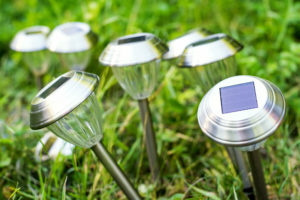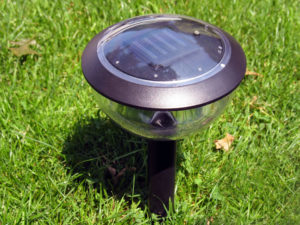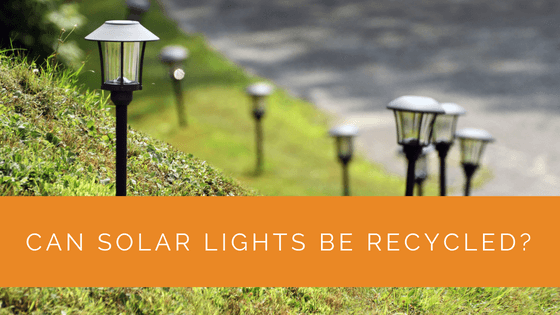Solar lights offer an eco-friendly, cost-effective solution to brighten indoor and outdoor spaces. Powered by the sun, they help you save on electricity bills and minimize your environmental footprint. These lights can provide ample illumination for extended periods when adequately charged.
While the demand for outdoor solar lights is on the rise, it’s essential to remember that even the highest quality motion sensor solar lights eventually wear out. Despite occasional battery replacements, there comes a time when they need to be replaced entirely. The question then arises: how should you dispose of these non-functional lights? The answer is simple: don’t treat them like regular garbage. Solar lights are recyclable, and by responsibly disposing of them, you can continue your commitment to the environment and your budget. In this guide, we’ll explore the proper ways to handle your old solar lights, ensuring they have a second life in recycling.
Contents
Key Takeaways
- Solar lights are a green and cost-effective alternative for indoor and outdoor use, but they eventually wear out and need disposal.
- When disposing of solar lights, it’s important to recycle them because they contain hazardous materials like lead and valuable components such as silicon and aluminum that should not go to landfills.
- Recycling solar lights can be challenging due to the lack of specialized recycling facilities. Still, you can break down the components like batteries, LED bulbs, solar panels, and fixtures for proper disposal or reuse.
How Can You Recycle Solar Lights?
Once your solar lights have reached the end of their life, please think twice before tossing them into the trash for waste disposal. They are eco-friendly, no doubt, but contain hazardous materials like lead and calcium that can present environmental troubles. Solar panels have valuable materials such as silicon, aluminum, and other precious metals that should not be tossed in landfills.
Conversely, you can’t easily recycle solar products compared to other electronics. Their recycling involves an expensive process, leading to minimal facilities expecting solar waste. The number is much less in the US than in Europe for solar recycling units.
Therefore, the clever thing is to look for other methods. One thing that you can do is dismantle your solar light and then dispose of each item separately. When broken down, a typical light contains rechargeable batteries, solar panels, a light bulb, a controller board, and the body – plastic, metal, or stainless steel.

Batteries
All types of solar lights use rechargeable batteries of one or other kind. In some cases, where they work, you can use these batteries to power other things that are part of your daily life. But if they are not functional, disposing of them is the only choice.
Hazardous materials must be treated like other household chemicals, such as paint, thinners, pesticides, and even specific medications. Instead of putting them in your regular trash, they must be stored for pick up or drop off at local recycling centers where this waste is collected and disposed of. Most areas have annual hazardous materials picked, so lucky for them.
Light Bulbs
If a solar fixture uses LED light, you can dispose of it through your trash by placing it in a plastic bag for pickup by the curbside. On the other side, some solar lights feature halogen or fluorescent light bulbs that should be disposed of the same way as batteries.
The halogen bulbs come with tungsten, while fluorescent contain mercury, and both should not enter your trash at any cost. You don’t want to harm your environment and take back your good deed of choosing solar lights.
Other Components
When you break down your solar light unit, you will see other parts of the light, such as a printed circuit board, solar cell, and photoresistor.
If you have a keen eye for environmental projects, you can reuse them for something green and good. If not, you can pack solar light parts and share them with someone else or keep them with you for the next e-waste visit.
Fixtures
Lastly, when you have taken care of all the parts of the solar lights, you will have with you the remaining fixture. Sometimes, the fixture body is made of glass, metal, or plastic, making it partially recyclable.
Some parts of your fixtures are not easily recyclable. So, in that case, you can either discard them in an e-waste unit or put them in the trash after carefully removing everything else.
However, before you throw them, how about you consider some possible uses for them? For instance, you can use them for DIY projects like candleholders, birdfeeders, and plant-holders.
Whatever you can think of!
Just brainstorm for ideas, and you will come up with something.
Solar Panels
Solar panels can last for between ten to fifteen years. So, chances are your LED bulb or batteries have stopped working, but the panel will still stand firm. You can use a voltmeter to confirm if it isn’t dead. You must connect the solar panel with a voltmeter and expose the former to direct sunlight. If the reading is above one volt, the board is functional.
You can use the solar panel with your gadgets, such as flashlights, wristwatches, and calculators.

How Long Do Solar Lights Last?
Solar lights are a fantastic way to upgrade your home with beauty and functionality without adding excessive strain on your pocket. The LED bulbs feature two modes – warm white and color changing. The former is perfect for daily lighting. At the same time, the latter is meant for holiday decorations such as Christmas, get-togethers, barbeques, etc. You have to push one button to change the mode. Easy-Peasy!
The great thing about these solar-powered lights is they last between two to five years, which is more than enough. However, at times, it could be more or less considering the type of batteries utilized and the exposure to sunlight. Also, some high-quality lights go on for ten years before eventually wearing off.
You can expect solar lights to function reliably for substantial years. And if the lights start to dim, you can upgrade them with changes until that is no longer possible.
Case Study: Effective Recycling of Solar Lights – A Practical Approach
Background
At Solar Panels Network USA, we are dedicated to promoting sustainable energy solutions. While solar lights provide an eco-friendly alternative for illumination, they eventually wear out, presenting a disposal challenge. Recognizing the need for responsible recycling, we embarked on a project to develop and implement effective recycling practices for solar lights.
Project Overview
Our goal was to establish a practical approach to recycling solar lights, ensuring that hazardous materials are safely managed and valuable components are reused. The project focused on educating our customers and providing them with resources and guidelines for the proper disposal of their solar lights.
Implementation
- Education and Awareness: We launched a comprehensive educational campaign to inform our customers about the importance of recycling solar lights. Through blog posts, newsletters, and social media, we shared detailed guides on how to dismantle and recycle various components of solar lights.
- Partnership with Recycling Centers: We partnered with local recycling centers to facilitate the collection and processing of solar light components. These centers were equipped to handle hazardous materials like batteries and bulbs, ensuring they were disposed of safely.
- Development of Recycling Kits: To make the recycling process easier for our customers, we developed recycling kits. These kits included tools for dismantling solar lights and bags for safely storing batteries and bulbs. Each kit came with clear instructions on how to separate and prepare components for recycling.
- Incentive Program: To encourage participation, we introduced an incentive program. Customers who recycled their solar lights through our program received discounts on new solar products. This initiative not only promoted recycling but also fostered customer loyalty and engagement.
Results
- Increased Recycling Rates: Since the launch of our project, we have seen a significant increase in the number of solar lights being recycled. Customers have embraced the initiative, appreciating the ease and convenience of the provided resources.
- Safe Disposal of Hazardous Materials: Through our partnerships with recycling centers, we ensured that hazardous materials like batteries and bulbs were handled properly. This prevented potential environmental contamination and promoted safer disposal practices.
- Positive Customer Feedback: Our customers have expressed gratitude for the guidance and resources provided. Many have shared their positive experiences and satisfaction with being able to contribute to environmental sustainability through proper recycling.
Summary
Our project to promote the recycling of solar lights has been a success, highlighting the importance of responsible disposal and the reclaiming of valuable materials. By educating our customers, partnering with recycling centers, and providing practical tools, Solar Panels Network USA has made a significant impact on reducing waste and promoting sustainable practices. This case study demonstrates that with the right approach and resources, recycling solar lights can be both feasible and beneficial for the environment.
Expert Insights From Our Solar Panel Installers About Recycling Solar Lights
Recycling solar lights isn’t just about proper disposal; it’s about reclaiming valuable materials like silicon and aluminum. By recycling, we minimize waste and contribute to a sustainable cycle of use.
Senior Solar Technician
When solar lights reach the end of their life, they still contain components that can be reused or repurposed. It’s crucial to break down these lights correctly to ensure hazardous materials don’t end up harming the environment.
Solar Installation Specialist
While recycling facilities for solar lights are limited, taking the time to dismantle and responsibly dispose of each part can make a significant difference. Every small effort counts in our journey towards a greener planet.
Lead Solar Engineer
Our Expertise in Solar Lights
At Solar Panels Network USA, we’re here to provide you with valuable information and support regarding solar lighting. With our experience and understanding of the solar lighting industry, our team of experts is prepared to assist you in finding the right lighting solution for your needs. Whether you’re interested in improving your outdoor spaces, conserving energy, or adopting a more sustainable approach, we’re well-equipped to help. Please feel free to contact us with any questions or inquiries.
The Final Words
The end is inevitable – all solar lighting will eventually stop working. But while you attempt to toss them aside to make room for new ones, ask yourself whether it is the right way to dispose of them. The answer would be no!
Despite being on the green team, they still contain harmful substances that can contaminate environmental health. So, it’s best to consider recycling solar lights to keep them away from landfills and prolong the life of this renewable energy.
However, recycling solar panels is not a cakewalk in the US. There are no specific solar light recycling centers available. But since these lights are here to stay and on the rise, facilities, and industries will surely develop for when they expire with time.
For now, as a general rule of thumb, how about you break down its components and recycle each part separately? The battery, LED light, solar panel, and fixture can all be handled individually. You can also ask the shop owner or manufacturer if they have a recycling program for the solar lights.
Remember, you took the right step by choosing solar light, so don’t take the wrong action by not recycling.
About the Author
Solar Panels Network USA stands at the forefront of solar energy solutions, driven by a team of seasoned solar engineers and energy consultants. With over decades of experience in delivering high-quality solar installations and maintenance, we are committed to promoting sustainable energy through customer-centric, tailored solutions. Our articles reflect this commitment, crafted collaboratively by experts to provide accurate, up-to-date insights into solar technology, ensuring our readers are well-informed and empowered in their solar energy decisions.

